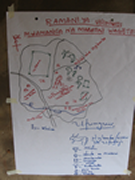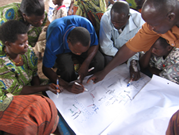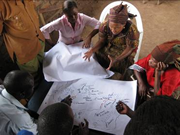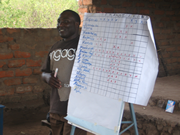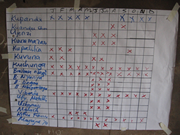In the Center for Sustainable Development’s
online field courses, students actually develop real projects with real community expressed need.
In tallying up different kinds of projects, by and large, more student projects are related to growing food than any other single community challenge.
There are projects that are designed to address unsustainable farming practices, developing farmer field schools, food insecurity, and home gardens for food security. There are projects on connecting subsistence farmers to markets so that they can increase family income, and projects on adapting agricultural practices in the face of climate variability.
Since water is so important to agriculture, and forests are a major part of the water cycle, there are reforestation, agroforestry, community-based forest management, forest stewardship and non-timber forest projects.
You can scan the list of student project activities and see the large number of agriculturally based project activities at the bottom of this page: http://www.csd-i.org/student-countries-ngos/ .
In a nutshell, people are hungry. 1 billion people are hungry in the world compared to 800 million in 2008. They’re faced with record drought and tremendous storms and floods. Farmers have depleted soils, a shortage of irrigation water, a lack of funds for purchasing seed and organic fertilizer. They suffer from a lack of knowledge of improved agricultural practices—and don’t realize that a family garden can help reduce hunger that builds in the months prior to the harvesting of
| Solutions |
 |
The solutions for these challenges can be very simple: soil conservation techniques like mulching, water conservation techniques like watering plant roots with buried water bottles—or with inexpensive micro-drip irrigation. Raised beds, simple fences, the provision of a diversity of vegetable seed, and simple training programs can build a community of family gardens which will not only generate food but generate income.
|
An article in the June 10 Guardian Weekly “The global food crisis: The right to decide what we eat” Ibrahim Coulibaly of Via Campesina brings up the issue of Food Sovereignty. Food sovereignty is the people’s right to decide what they eat and what they produce. The concept of food sovereignty arose in contest to the globalization of agribusiness and the challenges that food aid brings to developing communities.
Coulibaly argues that peasants and small farmers are the world’s main food producers yet they see that international food policies serve large conglomerates rather than the people. These policies transform small-scale agriculture into industrial plantations—and increase the use of chemical pesticides and fertilizers concentrating food production into the hands of multinationals—contributing to environmental degradation and to the loss of forests and biodiversity.
In the mid-90s a group of small farmer organizations came together to defend sustainable family farming and defined Food Sovereignty as: producing healthy food for local markets while creating jobs and protecting the land and its diversity. This was the original definition of Food Sovereignty. We at the Center support Food Sovereignty by providing training for field staff and subsistence farmers on how to do this.
Only a few years ago, these concepts would have challenged donor mission and government policy. But today, we don’t need to feel nervous about approaching a large donor with grassroots ideas such as Food Sovereignty. They have begun to see the value in local development and are becoming increasingly supportive of these efforts.
To see just two simple examples of the kind of training we offer in Food Sovereignty have a quick look at these courses:
Food Security, Nutrition and Home Gardens.
Community-Based Adaptation to Climate Change:
To learn about student projects in real time, please visit our Facebook Page or CSDi Development Community to see their postings.
Would you like to
subscribe to our newsletter? Learn more about the
Center?
The Center for Sustainable Development specializes in providing sound, evidence-based information, tools and training for humanitarian development professionals worldwide. CSDi is a 501(c)(3) nonprofit organization.

